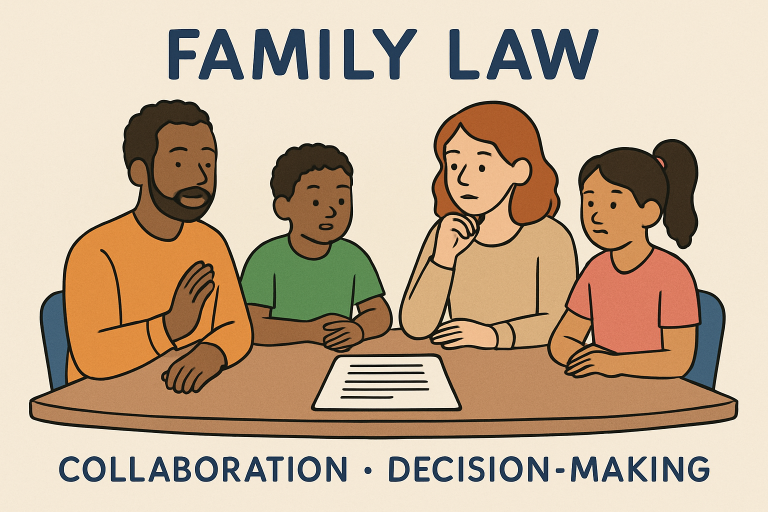Setting a path forward: Family law insights for changing lives
Understanding family law’s evolving landscape
Family law is a dynamic branch of legal practice, built to address the intricate and sensitive matters that affect today’s families. It governs issues related to marriage, divorce, child custody, support, adoption, and property division, touching on the moments that fundamentally shape lives. Laws and policies continually evolve to reflect changing social norms, technology, and modern lifestyles.
Keeping up with these evolving standards is crucial for anyone facing family law challenges. Consulting an experienced family law attorney is often the most effective way to ensure you make informed decisions. By working with a legal professional well-versed in current statutes and court trends, families can confidently chart a path forward through difficult transitions.
Recent legal changes highlight the importance of adaptability and knowledge. Whether dealing with divorce, adoption, or parental rights, staying updated can protect your interests and support long-term well-being. Families are increasingly diverse, and laws now recognize various structures—blended families, cohabitants, same-sex couples—emphasizing tailored legal strategies.
Key building blocks of family law cases
Most family law cases involve divorce, child custody, support, and adoption. Courts consider each based on fairness, the child’s best interests, and individual rights. Recently, courts favor less adversarial methods like mediation and equitable asset division. Shared parenting and flexible custody arrangements are now more common, accommodating parents’ schedules, living situations, and children’s emotional needs.
Parenting plans: Reflecting modern realities
Today’s parenting plans differ greatly from a decade ago, shaped by remote work, digital communication, and co-parenting normalization. Courts now prioritize arrangements supporting children’s routines and emotional well-being, regardless of family structure. Citing research from the U.S. Children’s Bureau, judges and attorneys focus on child development and stability, ensuring parenting decisions are legally sound and in the child’s best interests.

Division of assets and property: Fairness and transparency
Asset division is one of the most contentious aspects of family law, with different jurisdictions applying equitable distribution or community property standards. Regardless of the approach, courts require full transparency and comprehensive documentation of all assets, liabilities, and earnings. It is crucial to assemble thorough inventories of marital and separate property, gather appraisals for significant assets, and, if needed, consult financial experts. This process ensures a fair settlement and often reduces long-term disputes.
Child and spousal support: Trends and considerations
Determining support balances legal guidelines with practical and financial realities. Child support considers income, child’s needs, and state formulas. Spousal support depends on marriage length, earning capacity, and household contributions. Courts now recognize evolving family roles, valuing stay-at-home parenting and career sacrifices. Recent rulings and legislation influence support awards and modifications.
The role of mediation and alternative dispute resolution
Mediation and ADR are growing in family law as cost-effective, less adversarial alternatives to court. They foster collaborative solutions, preserve relationships, and reduce emotional strain. Technology enhances this with virtual sessions and file sharing, increasing accessibility and convenience, saving time and costs.
Mental health and well-being in family law
Modern family law increasingly considers the mental health and well-being of families, with psychological assessments, therapy recommendations, and input from child mental health experts influencing legal decisions and parenting plans. New research highlights how custody, divorce, and family conflict impact children and adults. Courts may mandate therapy or counseling to support emotional well-being, crucial for successful resolutions.
Staying informed: Where to turn for reliable family law guidance
Keeping current with family law is essential for protecting your interests. Reputable sources and local bar associations offer updates on legislation and court decisions. Community forums, advocacy groups, and support organizations provide guidance, share experiences, and connect individuals to legal and emotional support. Leveraging these resources helps individuals make informed decisions in family law matters.
Navigating family law with confidence
Family law evolves with changing norms, tech, and family structures. Staying informed is crucial for protecting interests, ensuring stability, and resolving disputes fairly. Families benefit from legal knowledge and emotional support, recognizing each case’s uniqueness. Seeking expert guidance, using reliable resources, and staying updated helps navigate transitions with confidence. Understanding these changes empowers families to protect rights, prioritize well-being, and build stronger futures.




